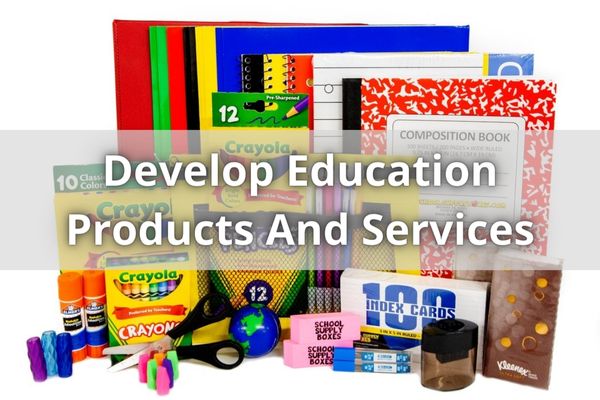Teaching Career Paths: A Comprehensive Guide For Educators
Are you tired of feeling trapped in your current teaching career? Are you looking for a way to take control back and set yourself on the path to success? Then consider exploring some of the different teaching career paths available.
You may choose the path that is best for you by being knowledgeable about what is available. Teaching offers many unique opportunities for professional growth that may not be found in other careers.
A Leader In The Classroom

Teaching is an incredibly rewarding career path. It can be challenging, but it also provides opportunities to inspire, motivate and engage students on a daily basis.
For those who wish to become leaders in the classroom, there are certain skills that must be developed. A leader in the classroom has the ability to create an environment of learning through positive reinforcement and encouragement. They must have excellent communication skills so they can effectively express their ideas and expectations to students.
Leaders should demonstrate patience while guiding students through difficult concepts and situations, as well as provide feedback when necessary. Additionally, having strong organizational skills will help them stay on top of lesson plans and curriculum design.
Ultimately, becoming a leader means setting high standards for yourself and striving each day to make sure your students reach their full potentials. Leadership in the classroom requires dedication, hard work, and passion – all qualities teachers possess naturally! With these attributes combined with effective strategies, you’ll soon find yourself inspiring others down this meaningful career path.
Open Doors By Pursuing An Advanced Degree
Open doors to a fulfilling teaching career by pursuing an advanced degree.
With the right education, you can gain the qualifications and knowledge needed for success in the classroom. Whether it’s getting certified as a teacher or specializing in a field, there are plenty of ways to grow professionally.
An advanced degree is also great for those looking to move up in their school district. If you’re interested in becoming a principal or vice-principal, having your Master’s Degree may be essential to helping you get noticed. Higher-level positions often come with higher salaries too, so this could open up financial opportunities that might have otherwise been out of reach. It could even provide access to job security and benefits such as healthcare and retirement plans.
So why wait? Pursuing an advanced degree now can help create exciting new possibilities down the road! Investing in yourself will pay off not just now but far into the future – giving you freedom and flexibility like never before.
3 Career Paths For Teachers

Let’s explore different career paths for teachers, from guiding students in the classroom to professional development opportunities.
We can discuss how teachers can best use their skills to find their own unique career paths. We’ll also look at how to use professional development to further their career goals.
Exploring Different Paths
Exploring different paths for teaching careers is an exciting journey, especially when you find the perfect match that works best for you.
Teachers can pursue many routes to success, whether it be becoming a teacher leader in their school community, earning educational credentials such as advanced degrees or special certifications, or even venturing out into private tutoring or consulting. There are endless possibilities available to those interested in pursuing a career in education and finding the right path will open up new doors of opportunity.
With dedication and hard work, teachers can reach heights far greater than they ever imagined possible with the right direction and guidance. So don’t be afraid to take risks and explore untouched territories – your future awaits!
Guiding Students
Leading students along their educational journey can be a fulfilling experience for teachers, who have the unique ability to empower young minds and guide them towards success.
By channeling that potential into tangible results, teachers can create an impactful legacy in their school community. It doesn’t matter if it’s through mentoring, tutoring or consulting, there are countless opportunities available for those passionate about guiding students on the right path. And with a little bit of optimism and some hard work, educators can reach heights they never thought possible – allowing them to show their pupils what individual ambition looks like!
So don’t hesitate; take action and start inspiring your students today!
Professional Development
Teaching is a profession that requires ongoing professional development in order to stay current. Devoting time and effort into learning new strategies, techniques and technologies can help maximize the potential of any teacher.
By taking advantage of available resources, such as continuing education classes or workshops, teachers can remain up-to-date on all the latest trends within their field – allowing them to better equip themselves for success. Professional development also offers an excellent opportunity to network with other educators, learn from one another’s experiences and build relationships across different educational institutions.
With so many options out there, it’s easy to find something that meets your needs and helps you reach your goals; giving you a chance to take control over your own career path!
Become A Master Teacher
Teaching is an important and rewarding career path to follow, but there are even more opportunities available. Becoming a master teacher can open up new doors and bring greater satisfaction in your work.
Engaging in activities such as mentoring other teachers or engaging with students outside the classroom can help you become a respected leader in the teaching profession. You will earn priceless experience via leadership responsibilities that will help you and others around you.
Instead of merely being another teacher, you’ll have the potential to significantly improve the educational system. Plus, mastering the art of teaching offers numerous personal rewards; you may find joy in helping others reach their full potential or feel proud when your former pupils exceed expectations due to your guidance.
All these things give us a sense of fulfillment and purpose beyond our own lives. So if you’re looking for ways to expand your horizons within the field of education, consider becoming a master teacher: it could be one of life’s most rewarding experiences!
Lead A School Or District
Imagine the power of being able to shape a school or district and create an environment where all students can thrive. The thought of having that kind of impact is incredibly exciting, isn’t it?
You have a greater chance than ever to affect genuine change in education by rising to the position of leadership. You’ll be responsible for making important decisions that affect not just individual classrooms, but entire schools and districts. It’s a challenging yet rewarding job—one that requires strong leadership skills, organizational abilities, and excellent communication with staff members.
Leading a school or district means providing clear direction while recognizing each teacher’s unique needs—allowing them to bring their own creativity and expertise into the classroom without sacrificing standards or accountability.
As you work to ensure effective instruction for your teachers and high-quality learning experiences for your students, you must also stay engaged in current educational issues and advocate for policy changes when necessary. By doing so, you will become an essential contributor to improving student outcomes at every level.
Develop Education Products And Services

Leading a school or district is an incredibly rewarding career path that requires dedication, patience, and resilience. But if you’re looking to have more of an impact on the world of education beyond the walls of your own institution, then developing educational products and services could be the perfect opportunity for you.
Developing products and services offers tremendous potential for those who are creative problem-solvers with innovative ideas. From online learning tools to physical resources like textbooks, working in this field can give you the chance to make lasting change in how teachers teach and students learn.
Not only will it allow you to create something original from scratch, but also provide satisfaction knowing your work has had a positive effect on educators and learners alike. Your creativity can help develop new solutions that improve teaching methods and enhance student outcomes—allowing them to reach their full potentials without boundaries.
So don’t be afraid to dream big when exploring this career choice; by empowering yourself with knowledge and skills needed for success, you’ll open up doors for limitless possibilities within the education industry.
Work In Policy Or Advocacy
Immerse yourself in the world of policy and advocacy, where your voice can influence powerful decisions impacting lives.
Imagine being a leader who speaks up for those without a chance to be heard — that’s what you’ll get if you pursue a career in this field. The possibilities are almost endless when it comes to working in public policy or advocacy; from state legislatures setting laws, to national courts ruling on important cases, there is no shortage of meaningful work available.
You could serve as an advocate on behalf of communities often overlooked by society, like children with disabilities, immigrants needing legal aid, or people struggling with food insecurity. The impact here will reach far beyond words—you’ll have the opportunity to make real change that improves people’s lives every day.
It’s time to take action and use your unique skillset to help create positive transformation!
Become An Education Leader
Becoming an education leader is a great way to pursue a career in teaching and make a lasting impact on students. Leadership roles allow teachers to influence the direction of their school or district, create meaningful initiatives for their peers, and have access to more resources that can help promote academic success.
Here are some key steps to take when considering becoming an education leader:
- Develop Your Leadership Skills: Start attending conferences and workshops focused on educational leadership, as well as reading books about successful teaching leaders. This will provide you with knowledge and tools for leading others successfully.
- Grow Your Network: Make connections with other educators who have experience in leadership positions, so you’ll be able to learn from them directly when it comes time to apply for these roles. Also join professional organizations related to your field of interest such as state teacher associations or national groups like ASCD (Association for Supervision & Curriculum Development).
- Earn Additional Certifications or Degrees: Many states require special certification before individuals can become principals or superintendents. Earning additional credentials not only demonstrates competency but also shows employers that you’re serious about pursuing this type of work. You may want to consider going back to school full-time or taking individual courses part-time at a local college or university.
- Gain Experience: Whenever possible, volunteer within your current role in order to gain valuable hands-on experience working with faculty members and administrators—in addition to gaining insights into how the job works day-to-day. Having direct experience allows potential employers know what kind of value you’ll bring if hired for a similar position elsewhere.
These steps will set any aspiring educator up on the path towards becoming an effective education leader. With dedication and hard work, anyone can achieve his/her goals by helping schools reach higher levels of excellence while providing top quality learning opportunities for all students involved!
Careers In Education Other Than Teaching
Aside from teaching, there are a variety of other career paths within the field of education. Education is an ever-changing landscape; today’s educators have more options than ever before when it comes to what they can do with their skills and experience in the classroom.
From research and policy roles to private tutoring and consulting, these alternative pathways offer greater flexibility and control over how you use your knowledge—and where you take it.
For example, if you want to follow a more entrepreneurial route, educational technology companies allow teachers and administrators alike to develop innovative products that help students learn better or provide support for school districts looking for strategic solutions.
Alternatively, many organizations hire professionals who specialize in curriculum development and instruction design so they can create programs tailored specifically to each learning environment. With such diverse opportunities available, exploring the different career possibilities within education can open up new doors for those interested in making a lasting impact on student success.
Education Career Paths

It’s no secret that education is an incredibly rewarding career path. You have the chance to study with your pupils and further your professional development in addition to changing the lives of your students every day.
Becoming a teacher can be an incredibly fulfilling journey, as you are able to help shape young minds while exploring new ways of teaching. This doesn’t mean it comes without its challenges though. For many teachers, juggling all responsibilities – from lesson planning and grading assignments to providing emotional support for their students – can be overwhelming at times.
It takes courage, confidence and resilience to remain positive through difficult moments and keep faith in one’s own vision for success. With the right mindset, however, there is so much potential for growth with this profession – both personally and professionally!
Highest Paying Jobs In Education
The teaching profession is an incredibly rewarding and meaningful career path, but it can also be financially lucrative.
It may surprise you to learn that the highest paying jobs in education are not necessarily in traditional classroom settings. In fact, many of these roles involve more specialized instruction outside of the conventional school system.
From advising businesses on employee training initiatives to working with government organizations on educational policy development, there’s a variety of ways to make a living as an educator without having to step into a typical school environment.
These higher-paying positions tend to require advanced degrees or certifications, so anyone looking for top dollar should consider investing their time in furthering their studies. Furthermore, developing expertise in specific areas such as special education or technology integration could open up even more opportunities for high-level salaries and promotions down the line.
With dedication and hard work, educators can use their skillset to create pathways towards financial stability while pursuing their passion for teaching others.
Growing Careers In Education

Now that we’ve discussed the highest paying jobs in education, let’s look into growing careers in teaching. For individuals who desire to improve the lives of children, there are several work options in the constantly changing sector of education.
Here are three ways you can pursue a career path in education:
- Teaching: If you have experience working with children or adults, teaching may be a great option. You can teach at any level from kindergarten through university depending on your qualifications and interests. With so many different subject areas to explore, teaching provides lots of room for personal growth and development.
- Administration: From school principals to superintendents, administrators play an important role in managing educational institutions. If you’re interested in leading others and making sure schools run smoothly, then administration might be right up your alley!
- Counseling: Counselors provide guidance and support to students as they navigate their academic journey. This profession involves helping young people build self-esteem, develop healthy relationships, set goals, and make decisions about their future. It requires strong interpersonal skills as well as empathy and understanding for the issues faced by today’s youth.
With these three paths open before you, it’s easy to see why education has become such an attractive career choice for so many people around the world. There’s something special about having the power to shape minds and futures – not just yours but also those of countless generations yet unborn!
Conclusion
I believe that teaching is a great career path to pursue. Although there are difficulties, the benefits are worthwhile. I’m thankful that I chose to work in education since it can be a really fulfilling profession. Everyone may succeed as a leader in education with commitment and effort. There are so many different pathways one can take while pursuing a career in education, from early childhood teachers to higher education administrators.
No matter which direction you choose to go, there’s plenty of support available along the way. So if you’re looking for a fulfilling career with potential for growth and development, consider giving teaching a try!







